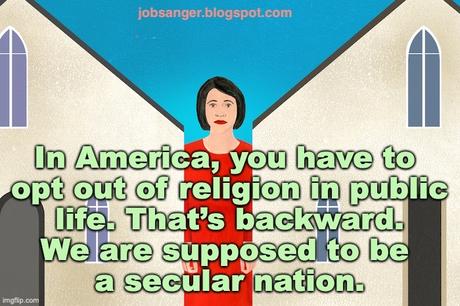 This is part of a thought-provoking article by Kate Cohen in The Washington Post:
This is part of a thought-provoking article by Kate Cohen in The Washington Post: Despite the promise of our Constitution, we don’t really live in a secular nation. . . .
In our country, religion is the default, and the burden of opting out — even the burden of knowing you have the right to — falls on the nonbeliever. . . .
I’m so tired of this.
The first time I remember opting out was in elementary school in rural Virginia, when my classmates went to learn about Jesus every week in a trailer off school grounds. I got to stay behind in an empty classroom because I was Jewish.
Now, I’m an atheist and I live in New York state, which requires public schools to lead students in the Pledge of Allegiance every day. In theory, when my children were younger, they had the right to get out from “under God” as long as they didn’t mind being, you know, those kids. The only way not to stand out was to stand and recite, like everyone else.
The Supreme Court doesn’t think I should mind. In 2014, Justice Anthony M. Kennedy, in Greece v. Galloway, upheld the constitutionality of prayer at town board meetings, no matter that religious prayer might exclude some people. “Should nonbelievers choose to exit the room during a prayer they find distasteful,” he wrote, “their absence will not stand out as disrespectful or even noteworthy.” No problem, nonbelievers: You are free to leave.
I am grateful for my civil rights and am keenly aware that many countries afford no such escape clause. But mine is supposed to be a nation whose laws and institutions do not endorse any religion, even as they offer protection to those who believe.
In a secular nation, if your public school required you to get your children vaccinated, but your religious beliefs prevented you from doing so, you could get an exemption — not from lifesaving public health regulations, of course, but from public school.
In a secular nation, if you believed Islam prohibited you from seeing an image of the prophet Muhammad, you could choose not to look.
That’s what an art history professor at Hamline University in Minnesota apparently assumed, when she warned students in her syllabus and in her class last fall that she intended to show a 14th-century painting of the prophet. Thinking she was living in a secular nation, she offered her students the chance to opt out and then showed the image. She was fired
Of course, people can always sue; the professor is. But that seems backward, like having to take special steps to make your phone protect your privacy. Our rights should come standard right out of the box.
In January, Americans United for Separation of Church and State and the National Women’s Law Center filed suit in Missouri, arguing that the state’s extreme abortion ban imposes a narrow religious belief on everyone else. Indeed, lawmakers had cited religion as motivation for restricting the reproductive choices of the people of Missouri, and the law itself refers to “Almighty God” as “the author of life.”
In a secular nation, a legislator who thought abortion was a sin would absolutely have the right not to have one.
In our nation, by contrast, after that religious belief is enshrined into law, someone has to make the legal argument that Missourians “have the absolute right to live free from the religious dictates of others.”
They do — they have that right. We all have that right. It’s right there in the establishment clause of the First Amendment. But as long as this country’s default setting is religious — both culturally and politically — we have to fight for it.

